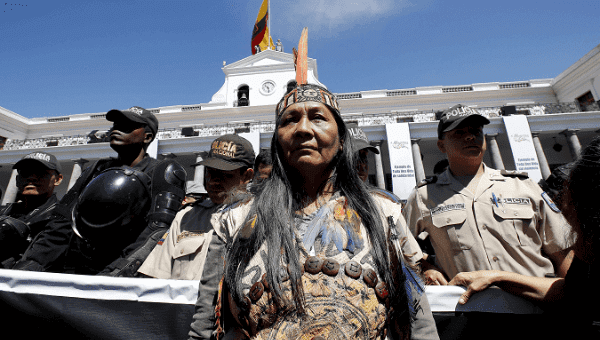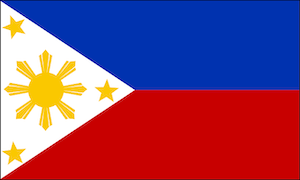March 16, 2018

Photo: An indigenous woman protests Amazon land rights in front of the presidential palace of Ecuador. EFE.

Earlier this week, a UN official investigating the Rohingya crisis said that her observations are leading her to believe that this may amount to genocide. “I am becoming more convinced that the crimes committed following 9 October 2016 and 25 August 2017 bear the hallmarks of genocide and call in the strongest terms for accountability.” In her report, she further calls for a thorough, unbiased, and serious investigation into the crimes being committed against the Rohingya. Myanmar later issued a rejection of this UN statement. Top officials in the country denied that Myanmar or its military had committed any crimes against the Rohingya. This comes even after the army has, on rare occasions, admitted to killing some Rohingya people. Nevertheless, the government’s crimes against the minority are egregiously brutal and targeted, far beyond what they have acknowledged at all.
In another part of the country, approximately 2000 people were displaced by military forces this week. The Karen (alternately ‘Kayin’) State in southern Myanmar is home to another of the nation’s ethnic minorities. In 2012, the people here negotiated peace with the central government, in talks led by Aung San Suu Kyi. This invasion and displacement of the people endangers that ceasefire, risking a plunge back into one of the longest-running civil conflicts in the world.

Miguel Rodrigues Torres, ex-interior minister and former Chavez spy chief, was arrested March 12 for “involvement in actions against peace” according to a government statement and for “conspiring to destabilize the government.” The statement accused him of plotting a coup with discontented military officers and of working for US intelligence, supporting Maduro’s suspicions of US meddling, although no evidence has been offered.
Torres was close with Chavez, aiding his short-lived coup attempt in ‘92. Since then, Torres served for a time as Maduro’s interior minister, but after leaving the post has distanced himself from the unpopular president, expressing support for the opposition protests and even looking to run as a presidential candidate (though he was barred due to “administrative irregularities”). He was also accused of collaborating with Oscar Pe?rez, the bomb-dropping helicopter pilot who was shot and killed earlier this year by government forces. Torres denies this connection.
On another note, the Venezuelan opposition group Broad Front is calling for mass street protests against the “fraudulent” presidential elections scheduled for May. Broad Front spokesperson and parliament member Negal Morales claims the group is insisting upon nonviolent demonstrations, saying “We are not fostering … the possibility of a confrontation between civilian people and armed people” and that they are pushing only for civic dissent. The group is asking Venezuelans outside the country to set up protests in solidarity, wherever they may be. Broad Front additionally asked for “citizen assemblies” to be set up in each of the Venezuelan states. These assemblies would help coordinate the mass protests country-wide on Saturday, as well as form chapters for the coalition and record membership.
Venezuela is expected to ask the UN to send international observers for the upcoming election. Henri Falcon, an opposition candidate, will join the UN ambassador in his request, despite the main opposition’s fears that observers will only lend legitimacy to the elections.

President Rodrigo Duterte announced that he is pulling the Philippines out of the International Criminal Court (ICC). He notified the UN Secretary General of this decision on Friday, along with a supposed assurance of the Philippines’ commitment to the rule of law. In the official letter submitting the decision, the Philippines called this move a “principled stand against those who politicize and weaponize human rights.” Duterte has notoriously been accused by the ICC of crimes against humanity, including the killings of thousands in his crusade against drugs. According to ICC protocol, the withdrawal will officially take effect in one year.
Earlier in the week, the Chief Justice of the Philippines has said that she will not resign, despite the impeachment complaints facing her. Lourdes Sereno has said that to quit would be easy, but that the people of the country deserve someone to fight for justice. Sereno is one of the few, and perhaps the most important, of those in government resisting Duterte’s war on drugs. She also famously opposed the president by voting against the martial law implemented on the island of Mindanao and against the decision to posthumously bestow full military honors on former dictator Ferdinand Marcos. Sereno maintains that she will fight for innocence of these current politically-motivated charges until the end.

Turmoil hit the US government again this week with the firing of Secretary of State Rex Tillerson by President Donald Trump. Tillerson and Trump have long been known to disagree on foreign policy in critical areas, including the Iran nuclear deal, the Paris Climate accord, North Korea, and the “overall tone of U.S. diplomacy,” according to Trump in a recent statement. With such a wide range of policy disagreements in critical area, this firing does not come as a huge surprise. It is, however, seriously concerning to those both in the US and abroad. The timing comes right before the summit between Trump and North Korean leader Kim Jong Un, plunging the event into an even deeper level of uncertainty. In the tweet Tuesday that fired Tillerson, Trump also announced that current director of the CIA, Mike Pompeo, is to become the new US Secretary of State.
Tens of thousands of students nationwide walked out of their schools Wednesday to protest inadequate gun control in the US. This was the latest in a series of demonstrations by the ‘Mass Shooting Generation’ that was raised in a society where school shootings are treated just as an unfortunate fact of life. During this protest, many students marched outside their schools, holding powerful signs and demanding stricter gun control. Others held moments of silence, organized shows of solidarity, or used the opportunity to spread compassion among the student body, to let others know that they’re not alone.

Thursday saw the largest single day exodus of the war that has now plagued Syria for more than seven years. Between 10,000 and 15,000 people fled the Eastern Ghouta region that is currently heavily under siege. The battle over this area has already left more than 1,500 dead and more than 6,000 injured – numbers expected to rise until an effective ceasefire can finally be reached. Russia, although aware of the humanitarian tragedies playing out on the ground, has yet to propose or enact a plan that would effectively help the civilians affected. A report by Al Jazeera this week condemned the lack of food being allowed to enter the region. Approximately 25 trucks of food were permitted entry to the region, containing less than two days’ worth of food per family there.
Meanwhile in Afrin, another deadly offensive rages on. Here too, hundreds of families are fleeing for their safety. The Turkish attack has killed at least 20 people so far. Like in Eastern Ghouta, however, there does not seem to be a clear end to the violence in sight for this Kurdish city. Turkey has today dropped leaflets inviting surrender and “warning residents not to act as human shields for terrorists.” It remains yet unclear how the city will respond.
Maldives – The EU Parliament put through a resolution this week to impose sanctions that target the Maldivian government, in response to its worsening political crisis. This is yet another sign of the mounting and increasingly widespread international pressure on the small island nation. – AVAS
Zimbabwe – In the first televised interview with Robert Mugabe since his ousting in November, the former leader declared that the rise of Mnangagwa was an unjust coup d’etat. “We must undo this disgrace which we have imposed on ourselves, we don’t deserve it… Zimbabwe doesn’t deserve it.” – The Guardian
Brazil – Councilwoman and prominent human rights advocate Marielle Franco was assassinated in Rio de Janeiro this week. She had been one of the most important and well-known defenders of civil and human rights in Brazil. – teleSUR
Cuba – Cubans took to the polls last weekend to elect a new government, ushering in the end of the Castro era. The planning for this transition is now underway. – Jamaica Observer
Ecuador – Dozens of Amazonian women have taken to protest a law that permits extraction and development of the rainforest by camping out in front of the presidential palace. They are demanding a meeting with President Lenin Moreno, to challenge him on this decision, which they call unlawful and short of international regulations. – teleSUR
Peru – The nation’s congress has begun impeachment proceedings against President Pedro Pablo Kuczynski. His charges involve a massive corruption scandal with the Brazilian construction company Odebrecht. The overwhelming number of lawmakers behind this measure give serious credence to the prospect that the impeachment will go through. – Washington Post
Mexico – A report released by the UN this week reveals human rights violations and cover-ups by the Mexican authorities in their investigation into the disappearance of 43 students in 2014. – Amnesty International
CANVAS News
Journalist’s Murder Sparks Protests and Progress in Slovakia
Two weeks ago, an investigative journalist was murdered. In the time since, tens of thousands of people have taken to streets across Slovakia, demanding justice, change, and a better, more democratic future.
“O, Canada, You’re on Native Land”
Kinder Morgan, North American energy infrastructure giant, wants to build a new pipeline through indigenous land, endangering the waterways and all those who live there. The people of First Nations are standing up and fighting back. Their resistance movement includes building Tiny Houses as an assertion of indigenous sovereignty and taking the struggle to the courts.